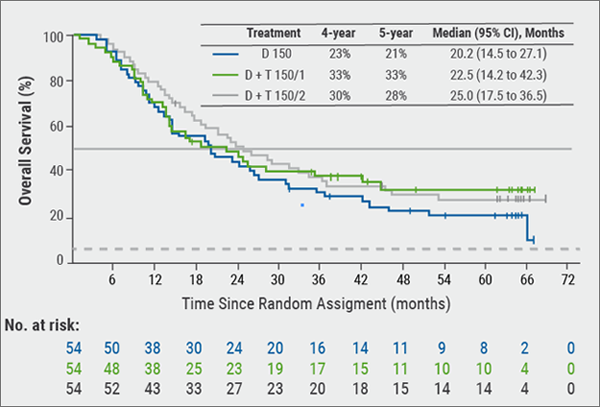https://doi.org/10.55788/782bdbba
“Ritlecitinib is not just a JAK inhibitor, it is also a TEC inhibitor, and TEC is in the tyrosine kinase family which plays an important immunological role in the pathogenesis of AA,” Dr Athanasios Tsianakas (Fachklinik Bad Bentheim, Germany) explained [1]. Dr Tsianakas presented a post-hoc data analysis of the ongoing, open-label, phase 3 ALLEGRO-LT study (NCT04006457) evaluating the efficacy of ritlecitinib in inducing hair growth in patients with AA.
Besides roll-over participants from phase 2 and 3 trials, new participants with ≥12 years of history of AA with a ≥25% scalp involvement were eligible for inclusion. This resulted in 449 participants with a mean age of 33 years, 64% women, and a mean SALT score of 74.5. The participants were analysed in 5 different groups of SALT severity at baseline, the most severe group comprising participants with a SALT score of 95 to 100, the latter defined as total loss of scalp hair.
The results showed a continuous decrease in SALT from month 1, with all but the most severe group attaining a median SALT between 1.0 and 2.4 at month 15. The group starting with SALT 95–100, achieved a score of 30.9. The assessment of those with at least 80% (SALT20) and 90% (SALT10) re-growth of hair resulted in similar results: SALT20 was reached by 83.3–93.0%, SALT10 by 73.5–81.0%, apart from the most severe group who achieved between 43.9% and 33.5%, respectively.
Adverse event-induced study or ritlecitinib discontinuation was observed in 4.9% of the participants. Dr Tsianakas highlighted that no opportunistic infections and no cases of deep vein thrombosis were reported. “There were no new symptoms or signs reported, so it seems to be a relatively safe drug,” Dr Tsianakas summarised the safety data on ritlecitinib.
In his conclusion, Dr Tsianakas suggested keeping in mind that starting treatment at more advanced stages of AA could make success more difficult.
- Tsianakas A. Efficacy of ritlecitinib in patients with alopecia areata by extent of hair loss at baseline: post hoc analysis of the phase 3 long-term ALLEGRO-LT study. FC01.1, EADV Congress 2023, 11–14 October, Berlin, Germany.
Copyright ©2023 Medicom Medical Publishers
Posted on
Previous Article
« Alopecia areata: remarkable regrowth rates with deuruxolitinib Next Article
Vitiligo: Continuation of topical ruxolitinib successful in many initial non-responders »
« Alopecia areata: remarkable regrowth rates with deuruxolitinib Next Article
Vitiligo: Continuation of topical ruxolitinib successful in many initial non-responders »
Table of Contents: EADV 2023
Featured articles
Tapinarof on course to become a new topical treatment in AD
AD and Eczema in 2023
Tapinarof on course to become a new topical treatment in AD
Upadacitinib provides sustained skin clearance in adolescents and adults with AD
Sustained deep clinical and itch responses with novel IL-13 inhibitor
IL-13 inhibitor shows potential in atopic dermatitis
Encouraging results for amlitelimab in atopic dermatitis
Chronic hand eczema: patients share similar molecular signatures regardless of AD status
Severe hand eczema: dupilumab could be a future treatment
Psoriasis News
Dual IL-17 blockade yields efficacy on joints and skin
High-dose subcutaneous spesolimab prevents GPP flares up to week 48
Drug survival of guselkumab and risankizumab seems superior to other biologics
IL-23 blockers may lower the risk of developing inflammatory and psoriatic arthritis
First-in-class oral IL-23 inhibitor safe and effective for moderate-to-severe plaque psoriasis
Hidradenitis Suppurativa: End of the Diagnostic and Therapeutic Draught
Skin tape stripping allows a novel precision medicine approach in HS
Nanobodies: A novel way to treat HS
Anti-IL17 blockade leads to maintained pain reduction in patients with HS
Vitiligo: Novel Treatment Options
JAK1 inhibition: a promising forthcoming treatment option in vitiligo
Vitiligo: Continuation of topical ruxolitinib successful in many initial non-responders
Alopecia Areata: Novel Developments
JAK3/TEC inhibition achieves clinically meaningful responses in AA
Alopecia areata: remarkable regrowth rates with deuruxolitinib
Botanical drug solution improves hair regrowth in children and adolescents with AA
What’s New in Other Disease Entities
Nemolizumab shows high success rates in prurigo nodularis
Remibrutinib reduces itch, sleep problems, and activity impairment in patients with CSU
Innovative wound gel reduces frequency of painful dressing changes in epidermolysis bullosa
Best of the Posters
Women with psoriasis face increased adverse effects with systemic therapy
Improved AI tool shows high sensitivity rates in skin cancer detection
Dermoscopy training combined with AI significantly improves skin cancer detection
Related Articles
February 21, 2022
For sentinel node-positive melanoma treatment, location matters

December 20, 2018
CNNs and targeted combination therapy
© 2024 Medicom Medical Publishers. All rights reserved. Terms and Conditions | Privacy Policy

